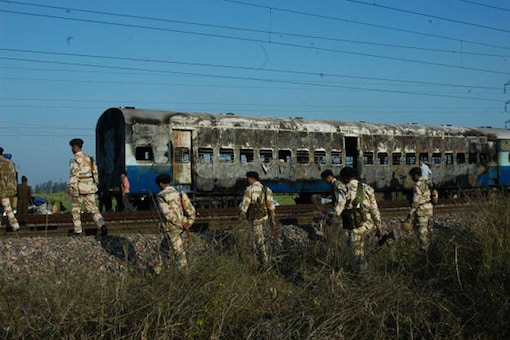
Sixty-eight people were charred to death in the blasts in two coaches of the Samjhauta Express in 2007. (Getty Images)
by Qura tul ain Hafeez 14 February 2023
William E. Gladstone expressed it quite well when he remarked that justice delayed is justice denied. The Samjhauta Express victims’ families have been waiting for justice for the horrible incident’s perpetrators for 16 long years. The Indian government’s investigation into the matter has stalled for the past few years due to a lack of confidence and the normalisation of relations between the two nations. Ironically, the enduring animosity between the two nations has its roots in the horrific events surrounding their independence.
Despite the fact that a considerably higher portion of the populations in both nations want to normalise the bilateral relationship than think Pakistan and India are stuck in a quasi-ideological impasse, these encouraging words, however, cannot always stop a crisis from escalating or take the place of formal procedures and effective channels of communication when trying to avert or diffuse a conflict. One such event that demonstrates the Indian government’s reluctance to hold the culprits accountable for their heinous deeds is the Samjhota Express incident. Unfortunately, it just serves to confirm the climate of impunity that terrorist attack perpetrators enjoy in India under the RSS/BJP-led, Hindutva-driven governmental system.
The Samjhauta train, which travelled twice a week between New Delhi and Lahore, was struck by an improvised explosive device (IED) on February 18, 2007, in the Haryana town of Panipat. 68 people died as a result of the tragedy, comprising 44 Pakistanis, 10 Indians, and 15 others whose identities are yet unknown. A total of 12 other people were reportedly injured in the attack. The event was initially attributed to a Muslim organisation, but afterwards, the National Intelligence Agency (NIA) of India detained Kamal Chauhan of the Hindu extremist group, RSS, in New Delhi. Chauhan, an explosives expert, detonated the train bomb. As part of the Samjhauta Express attack, it was also stated that RSS leader Swami Aseemanand was declared guilty by a court.
It has been 15 years since the terrorist assault on the Samjhauta Express, and the Indian government continues to withhold justice from the families of the dead. After it was revealed that Hindu extremist groups were responsible for the terrorist operations in February 2007, Pakistan urged India to share the results of the inquiry into the Samjhauta train explosions. Given India’s longstanding hostility towards Pakistan and the BJP government’s emphasis on Hindu nationalism, it is clear that India utilised the events of 26/11 as a propaganda tool against Pakistan. An unexploded bomb was found in the train, according to Vikash Narain Rai, a retired Haryana police official who oversaw the Special Investigation Team (SIT) from 2007 until early 2010. It was discovered that individuals connected to the RSS and its affiliated groups had purchased every component of that “incendiary device.”
India alleges that the Lakhvi trial (in connection with the Mumbai attacks) had been purposefully delayed yet after sixteen years, the case against Aseemanand is also still pending. Up until this point, the Samjhauta case’s justice has not been done. The daughter of a Pakistani victim who had petitioned to have her testimony recorded as a witness in 2019 was denied, and the court in Haryana then rendered its decision. The Indian court exonerated the four defendants, including Swami Aseemanand, on the grounds that the prosecution had failed to present its case.
Even though the history of relations between Pakistan and India has largely been one of rivalry, conflict, and a failure to resolve disagreements, there have been some encouraging signs, such as when the leaders of the two nations managed to contain a crisis or conflict or successfully resolve issues that were of such fundamental importance as the sharing of rivers. However, the odds for a better equilibrium, remain hazy under the present BJP government, which is led by Narendra Modi, a longtime supporter of the Hindu right-wing paramilitary RSS.
Moodi’s steadfastness in his belief in the Hindutva philosophy, holds that India ought to be a single nation that would be exclusively Hindu, and the minorities should be regarded as second-class citizens or even worse. The criticism, BJP-led government has received over the subject of forced conversions is both a case in point and an ideological expression of the new administration. Being the Prime Minister of a secular state, Modi would always have difficulties focusing on issues that could strengthen bilateral ties with Pakistan. If India does not disappoint, Samjhauta could be the beginning. There are instances where the two nations have in the past demonstrated the ability to manage crises, if not prevent them. For the region’s peace and stability, it is more important than ever to institutionalize this capability. The two neighbors, who are in conflict and have growing nuclear arsenals, can no longer afford to take the chance of a full-scale, devastating war.
